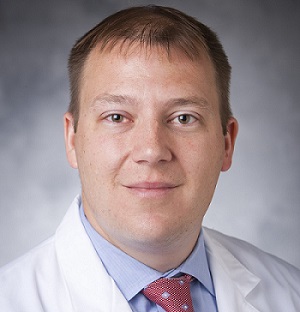Dr. Samuel H. Eaton, a urologist, has joined Brown Urology at the practice’s new location across from Newport Hospital. He discusses what it’s like to begin practicing medicine in a new office during a time when many patients are opting for virtual visits and his belief in taking an individually-based approach to treatments.
PBN: You made the transition to Newport amidst the COVID-19 pandemic. Has it been difficult to start forming a patient base with all of the public health restrictions in place?
EATON: Just like everywhere else in our society, COVID-19 has created huge obstacles and challenges for the practice of medicine. At this stage, with the advent of virtual visits and mask and screening precautions, the actual practice of medicine has returned to a relatively stable pace.
The aspect of this that is still difficult as I start in a new area is in creating the personal relationships that are so important with colleagues and the community. Even with the ability to use virtual platforms, there is really no match for the direct person-to-person interactions that we still need to minimize due to the pandemic.
PBN: Are you able to perform procedures and surgeries in a hospital setting again now that cases of COVID-19 have begun to decrease?
EATON: Procedures and surgeries now are mostly back to normal with COVID testing and other precautions in place. While many nonurgent procedures were halted during the peak of COVID, most of the surgery I do is not truly elective. At this point, with few exceptions, we are dealing with surgical problems as soon as feasible without waiting. Sometimes relatively minor problems can become life-threatening if not dealt with in a timely fashion, so it is important at this point that patients do not delay otherwise-necessary care.
PBN: What made you decide to come to Rhode Island from Duke University?
EATON: From the time of my training in Boston, I have always loved this area. It is a great place to live and raise a family. The opportunity with Brown Urology afforded me the chance to build a program in Newport that has the chance to bring top-quality specialized urologic care to this area. Having the support of a world-class academic urology program with a real vision to expand and improve access to urologic care in our state, along with an excellent hospital in Newport, made this a great fit for those goals.
PBN: What are the most common conditions that patients come to you with? Are patients doing a good job of staying on top of their urological health, or do a good number delay seeing a doctor?
EATON: I see a broad range of problems from kidney stones and enlarged prostate to prostate cancer and kidney cancer. While most people with kidney stones would not delay their care, many patients with problems like enlarged prostate or erectile dysfunction, which come on slowly, may wait until symptoms are severe before seeking care. I think because a lot of what we treat may be uncomfortable for patients to talk about, they may hesitate to bring these issues up with their doctor. A lot of these problems are incredibly common, and in most cases we have excellent treatments available.
PBN: I’ve seen that you believe in a holistic approach to caring for patients. Will you please elaborate on that?
EATON: Many of the problems I treat do not have just one potential solution, and decision-making can sometimes be complex. For example, in prostate cancer, patients often have choices ranging from observation to radiation treatment to surgical removal with risks and benefits to each approach.
It is easy as a specialist to just focus on what you are treating. In these cases, it is incredibly important to take into account everything going on with the patient. This includes not just medical issues but social circumstances, goals of care, background and prior experience.
Providing the best medical advice and treatment is always essential, but also giving the patient the knowledge, space and ability to make the best decisions specifically for them is incredibly important.
Elizabeth Graham is a PBN contributing writer.













